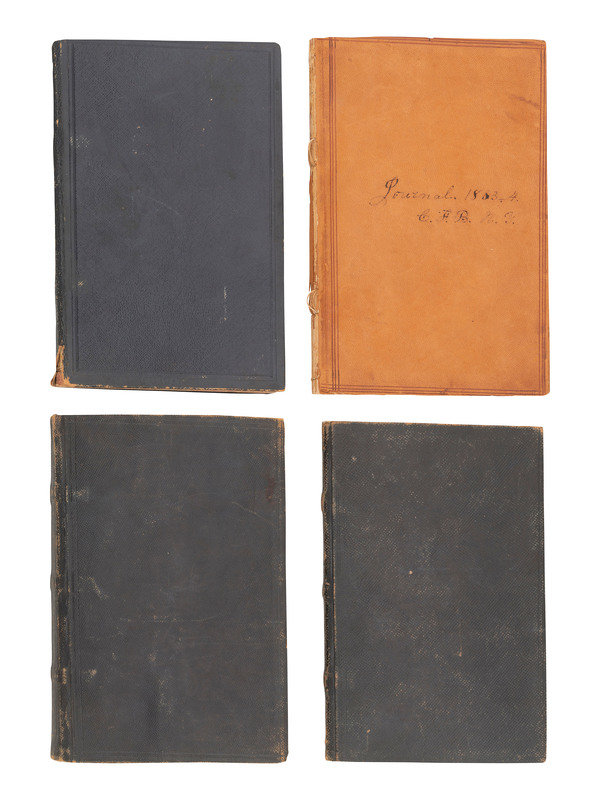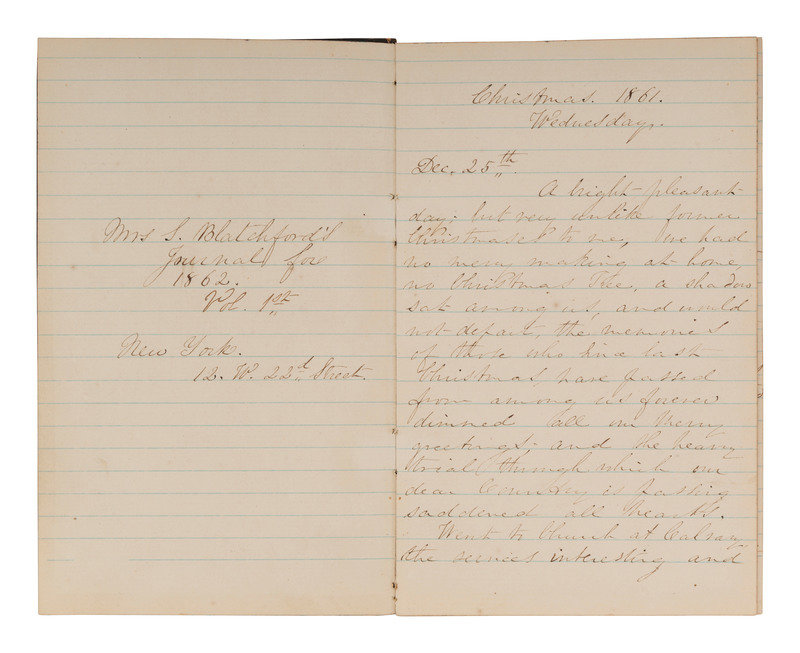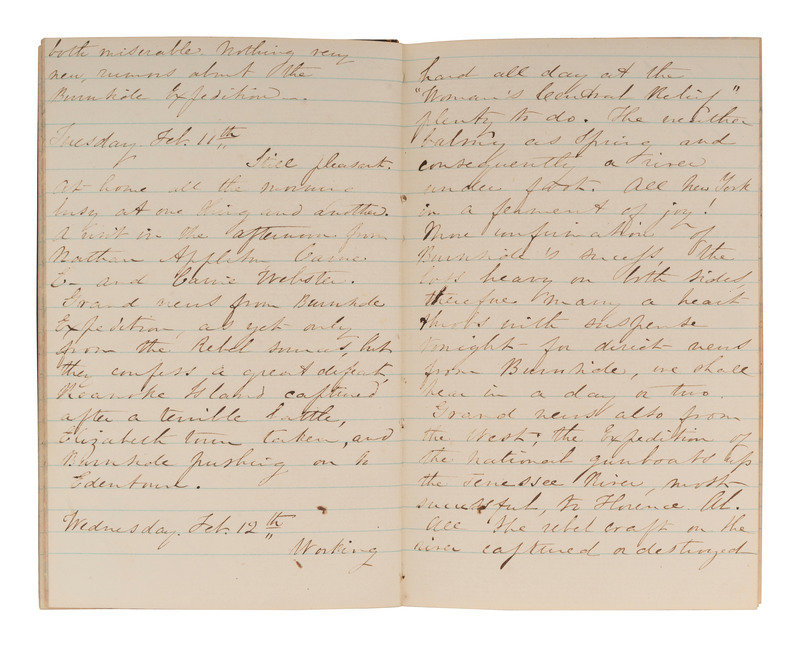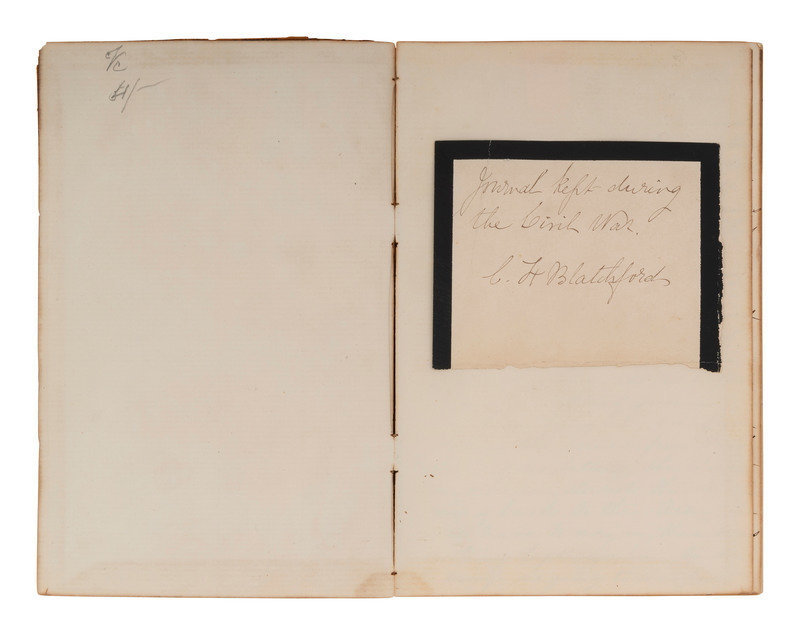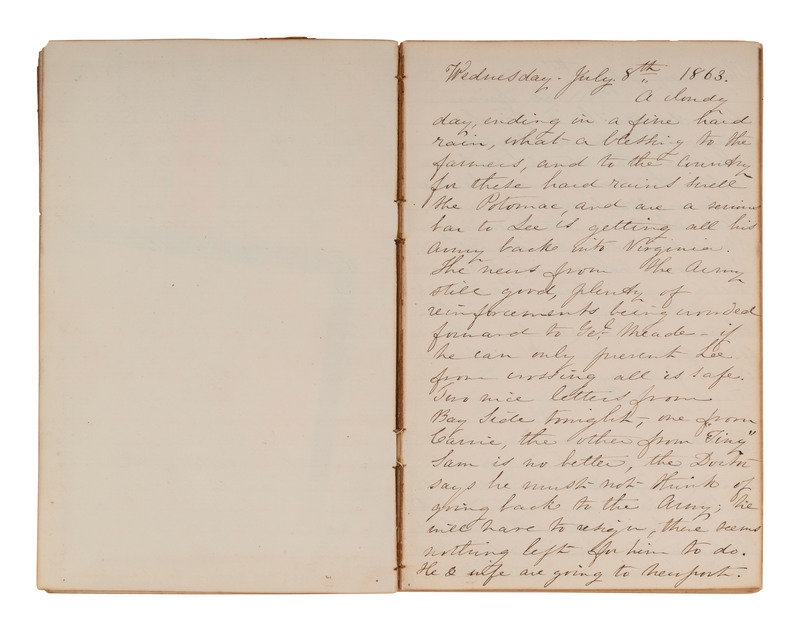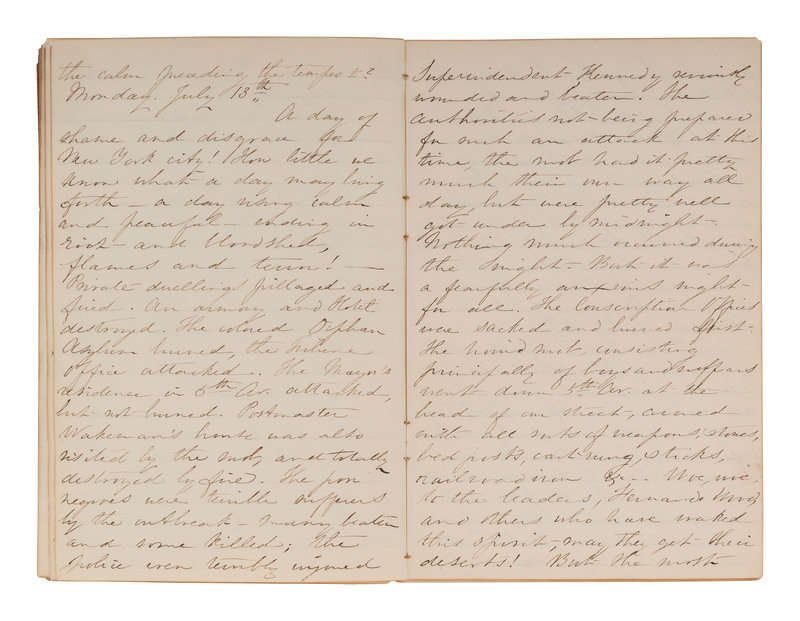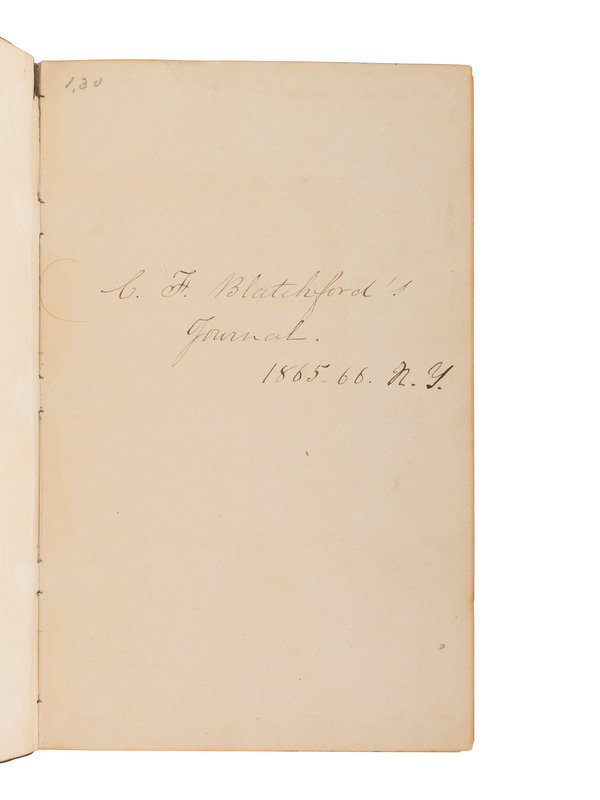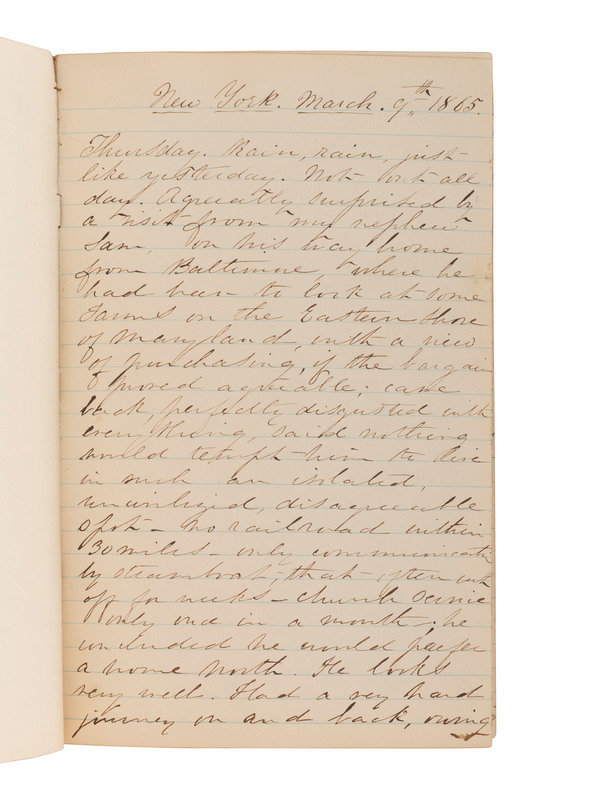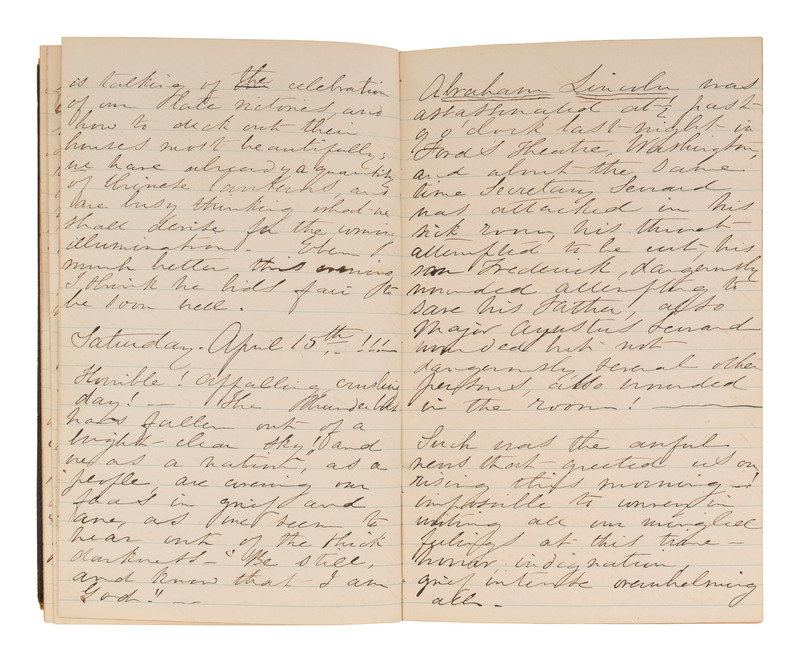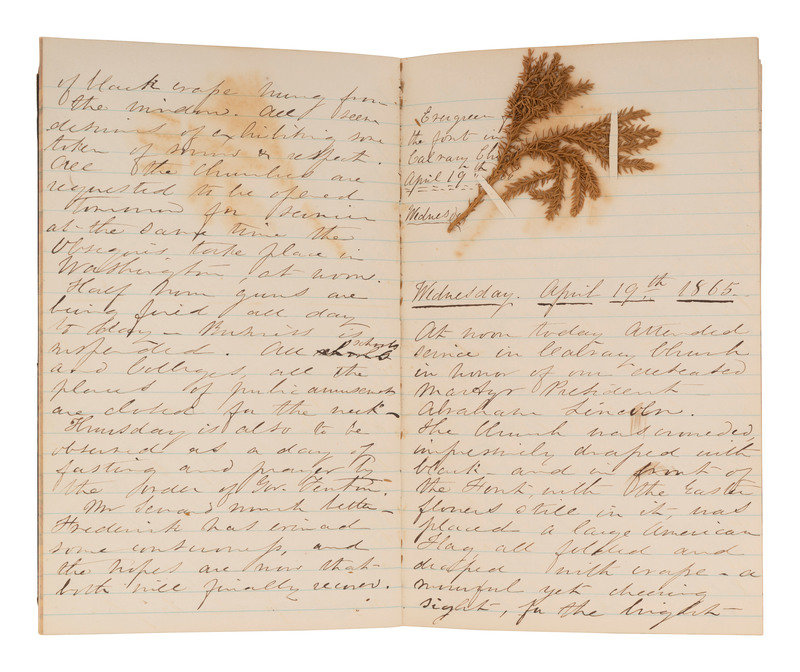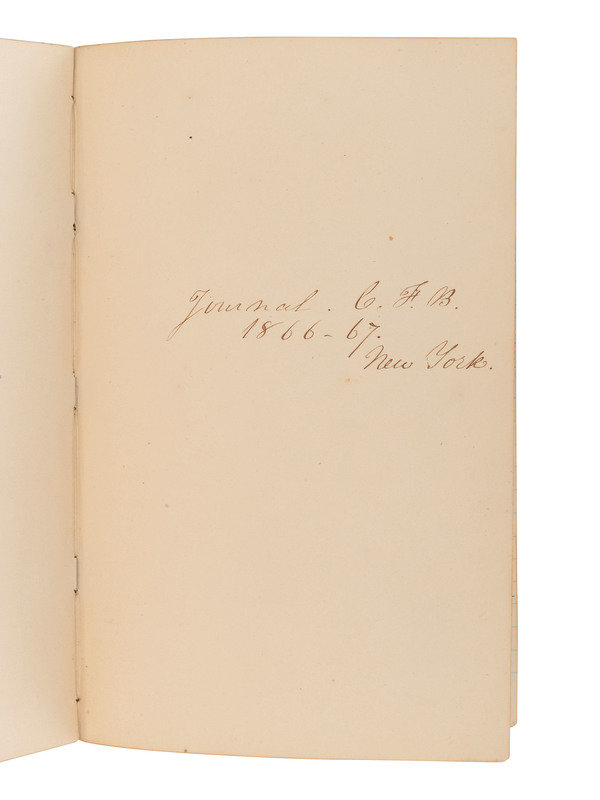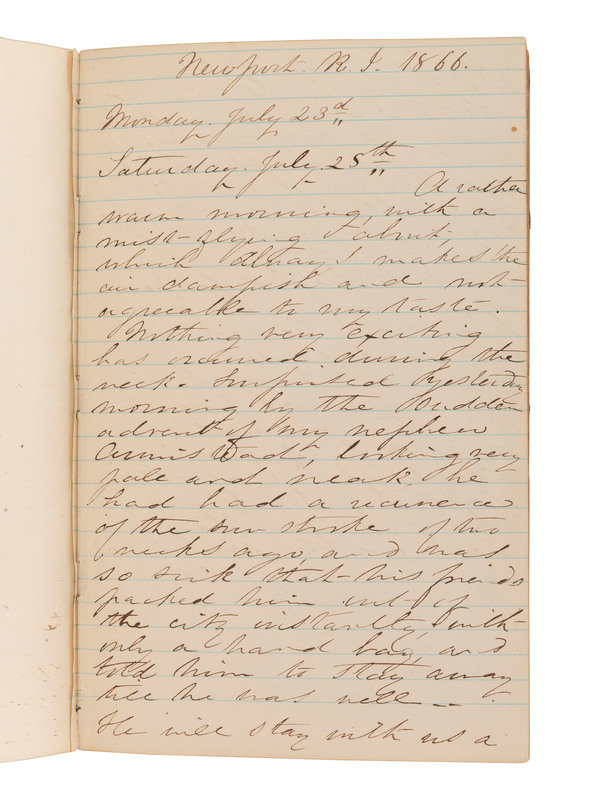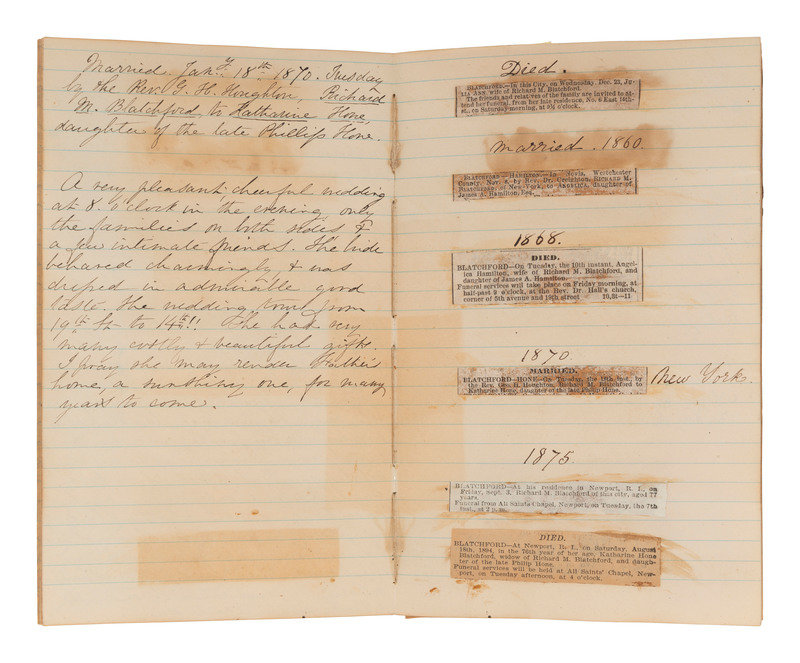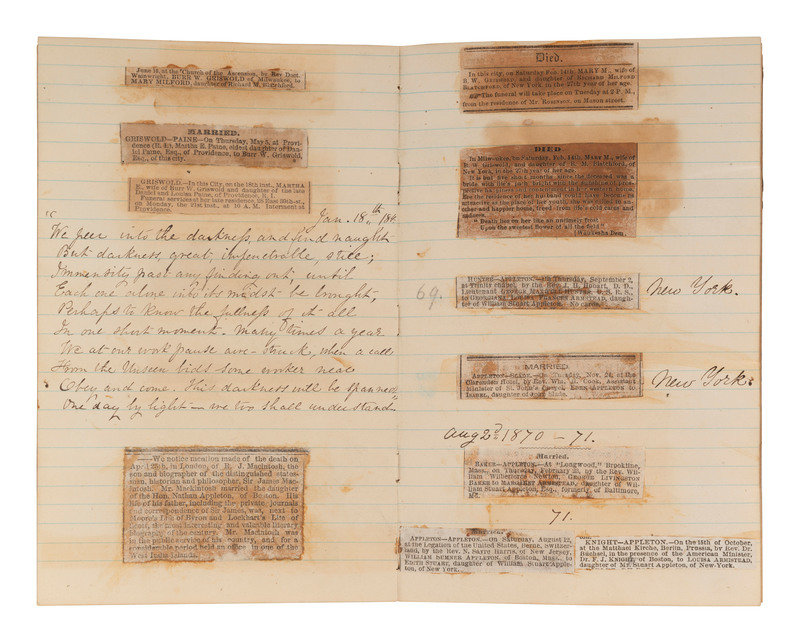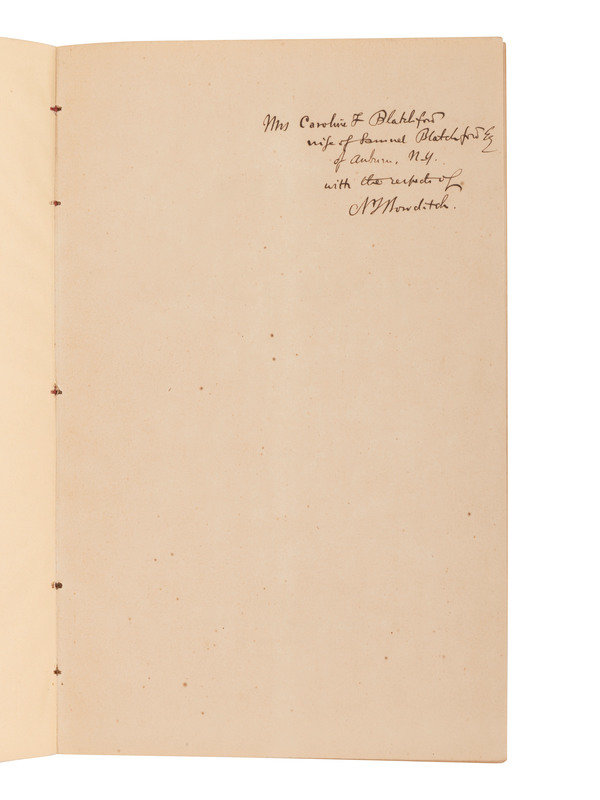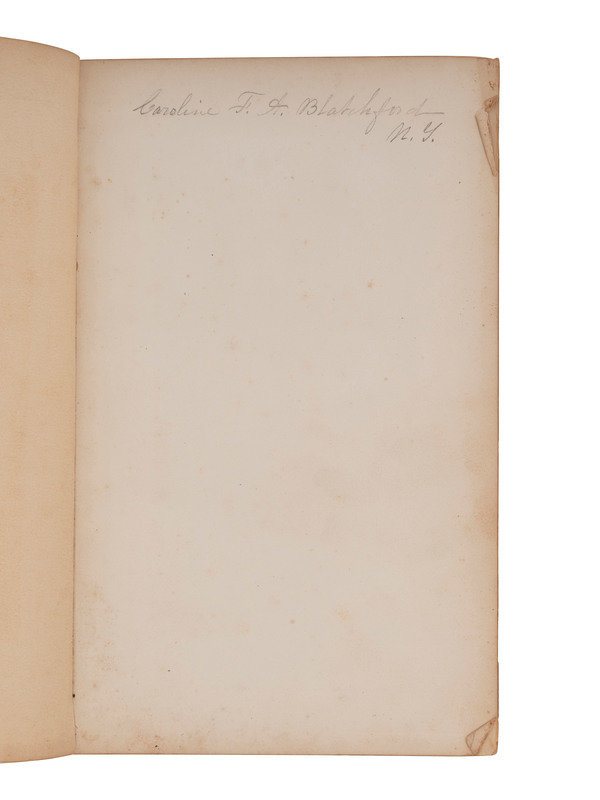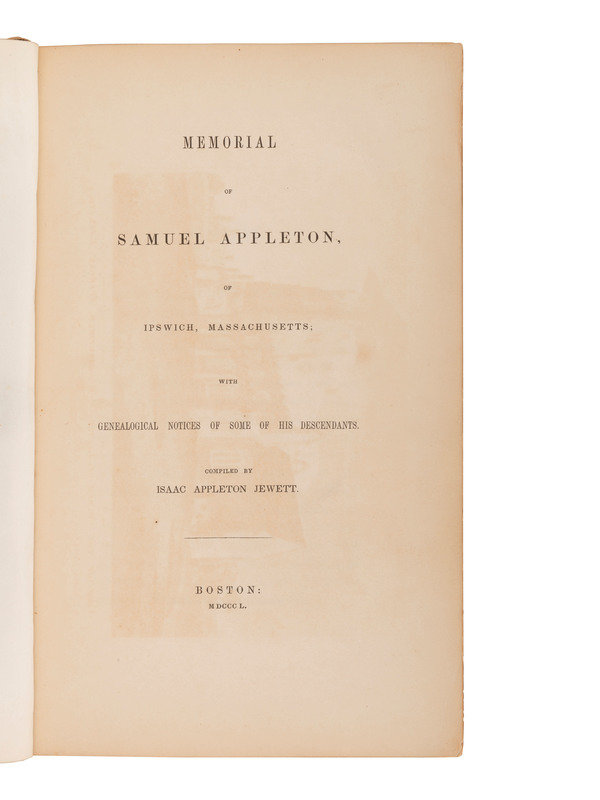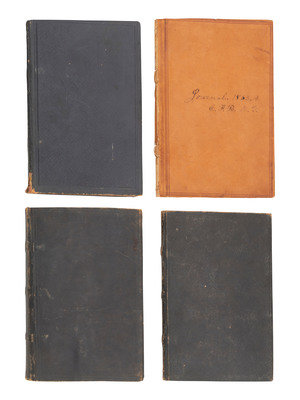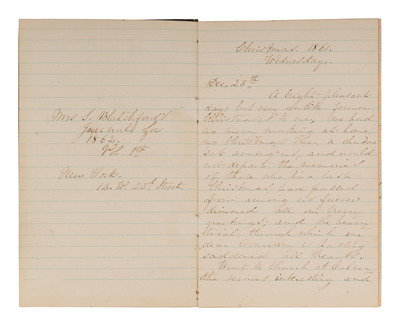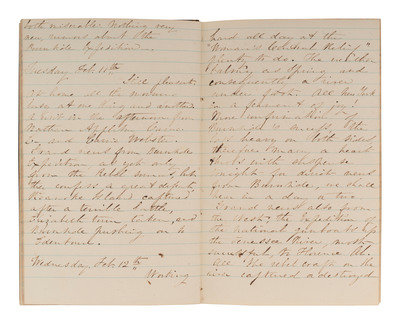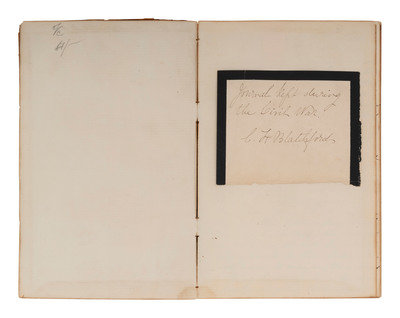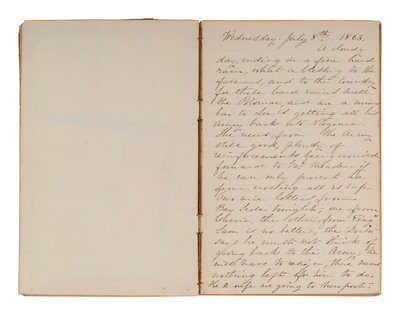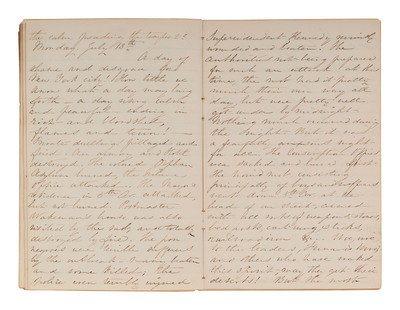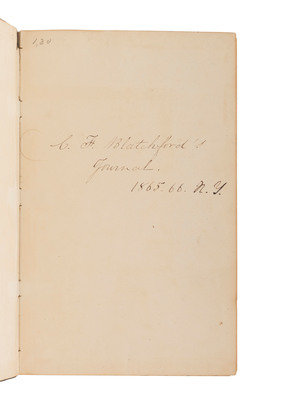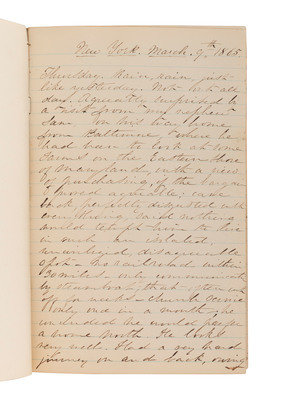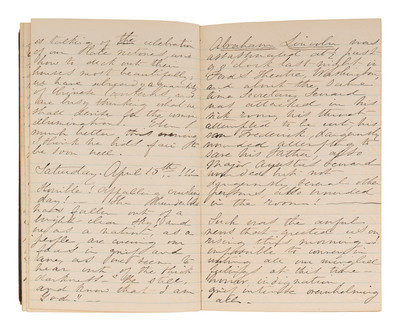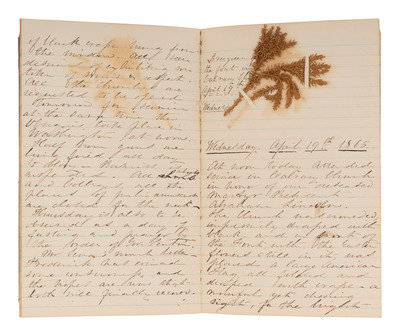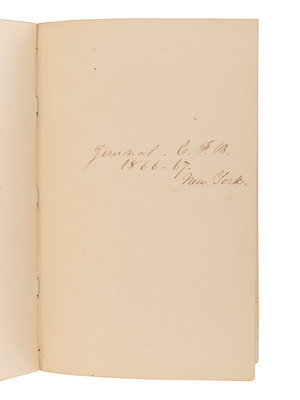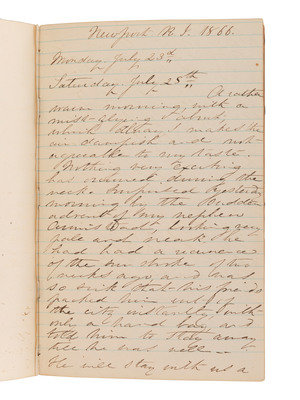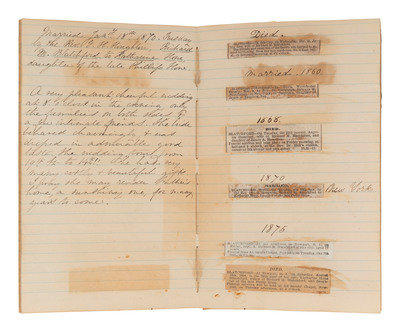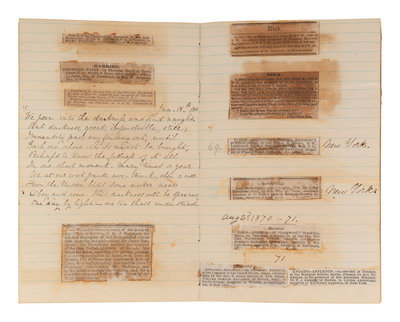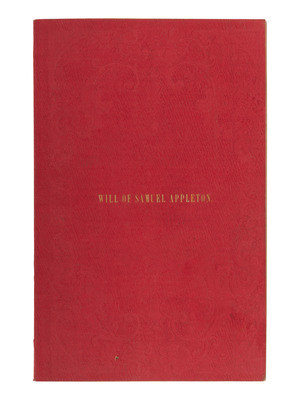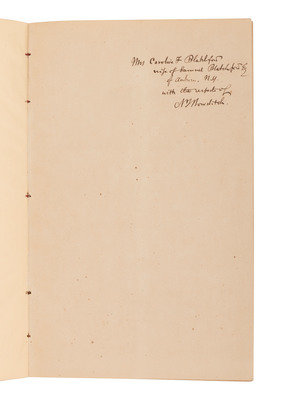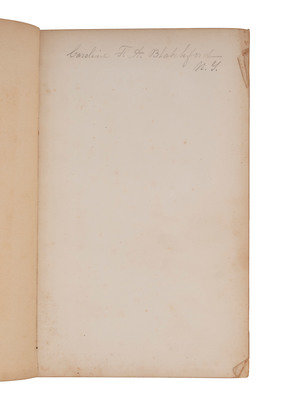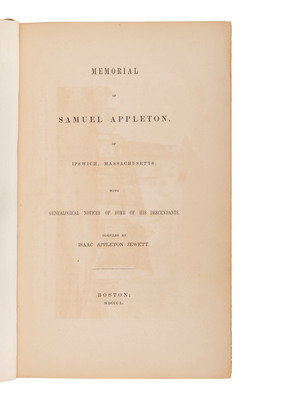Condition Report
Contact Information
Auction Specialist
Lot 159
[CIVIL WAR]. BLATCHFORD, Caroline A. (1817-1901). A group of 4 Civil War-era diaries written by Caroline Appleton Blatchford, including discussion of prominent New York families, the ongoing war, and work with the Women's Central Relief Association.
Sale 1192 - American Historical Ephemera & Photography
Lots 1-294
Jun 15, 2023
10:00AM ET
Lots 295-567
Jun 16, 2023
10:00AM ET
Live / Cincinnati
Own a similar item?
Estimate
$5,000 -
7,000
Price Realized
$9,450
Sold prices are inclusive of Buyer’s Premium
Lot Description
[CIVIL WAR]. BLATCHFORD, Caroline A. (1817-1901). A group of 4 Civil War-era diaries written by Caroline Appleton Blatchford, including discussion of prominent New York families, the ongoing war, and work with the Women's Central Relief Association.
4 diaries, each approx. 5 x 7 1/2 in. with leather bound paper boards, comprising: December 1861 - September 1862, 226pp, entries in pencil and ink; July 1863 - June 1864, 194pp, entries in ink; March 1865 - July 1866, 240pp, entries in pencil and ink; and July 1866 - September 1871, approx. 34pp of manuscript entries followed by approx. 38 pages of newspaper clippings dating up to ca 1896, some with manuscript annotations, entries in pencil and ink. All diaries in generally good condition with clean pages and legible text, though covers have visible wear, scuffing, and varying degrees of loss or wear to spine, particularly the 1863-4 diary which has heavily worn spine and loose binding. Provenance: By descent through the Blatchford family to current owner.
The first diary, inscribed on the first page "Mrs. S. Blatchford's / Journal for / 1862. Vol. 1st / New York / 12. W. 22d Street," commences on Christmas Day 1861: "A bright pleasant day; but very unlike former Christmases to me, we had no merry-making at home, no Christmas tree, a shadow sat among us, and would not depart, the memories of those who since last Christmas have passed from among us forever dimmed all our Merry greetings, and the heavy trial through which our dear Country is passing saddened all hearts." So Caroline Blatchford begins her journal, coalescing personal events with the violent political turmoil gripping the nation in a fashion that would remain consistent throughout each of her diaries. The following day Caroline records her first mention of a visit to the "Central Relief," an organization officially known as the Women's Central Association of Relief which was based at No. 10 Cooper Union, New York City. Caroline alternately identifies the organization in her diary as "the Central Relief," "Woman's Central Relief," "No. 10 Cooper Union," "No.10" or "Cooper Union," and refers to it roughly 45 times throughout the course of her diary. This relief agency, the roots of which were established at a meeting of women in New York City in April 1861, was at the forefront of Union relief efforts and was a precursor to the United States Sanitary Commission. Caroline regularly visits the organization's office in New York City, and at times describes her work there.
Social and personal engagements such as relief work at Cooper Union, trips to the dressmaker or the opera, attending church, house calls, dinners, and family visits are all mainstays of Caroline's diaries. The Blatchfords are connected via marriage not only to the Appletons of Boston, but also to Massachusetts politician Daniel Webster and the Hamilton and Schulyers of New York. The William H. Seward family is closely associated with the Blatchfords, both professionally and personally. Other families mentioned in the diaries include, in part, the Fletchers, Wards, Edgars, Potters, Morgans, Bensons, Hopkins, and Griswolds. Yet in addition to recording visits and visitors, Caroline's regular diary entries contain a steady stream of commentary on the latest developments in the war, often describing in detail the latest news of engagements. Multiple diary entries record trips made by her husband, father-in-law, and Governor Seward to and from Washington, D.C., placing her family on the pulse of wartime activity, in the Sewards inner circle, and well-positioned to receive news of Union fortunes. Caroline writes on 1 April 1862, "We hear through private sources that McClellan has commenced his march to Richmond, marching from Fortress Monroe, upwards." Like many Americans, Caroline is not just anxious on behalf of her country, but on behalf of her loved ones who served. Though her own son did not serve, her nephew Sam Appleton was an officer in the Massachusetts 12th Infantry, and is regularly mentioned in her diary. While he survived the war, Colonel Fletcher Webster, also of the 12th MA and Caroline's relative by marriage, was killed at the Second Battle of Bull Run on Aug 30, 1862, a fact which she records in her diary on 1 September.
Caroline's 2nd diary bears a handwritten inscription on leather cover: "Journal 1863-4 . C.A.B. N.Y." Perhaps one of the most compelling entries in the diaries is entered on 13 July 1863 in the aftermath of the New York Draft Riots: "A day of shame and disgrace for New York City! How little we know what a day may bring forth- a day rising calm and peaceful ending in riot and bloodshed, flames and terror! Private dwellings pillaged and fired. Our armory and hotel destroyed. The colored Orphan Asylum burned, the Tribune Office attacked, The Mayor’s residence in 5th Av. Attacked, but not burned. Postmaster Wakeman’s house was also visited by the mob, and totally destroyed by fire. The poor negroes were terrible sufferers by the outbreak- many beaten and some killed; the police are terribly injured. Superintendent Kennedy seriously
wounded and beaten. The Authorities not being prepared for such an attack at this time, the mob had it pretty much their own way all day, but were pretty well got under by midnight. Nothing much occurred during the night. But it was a fearfully anxious night for all. The Conscription Officers were sacked and burned first - the horrid mob, consisting
principally of boys and ruffians went down 5th Av at the head of our street, armed with all sorts of weapons, stones, bed posts, cart-rung, sticks, railroad iron, etc... But the most fiendish thing this lawlessness did to my mind was the burning of the 'Coloured Home.' Nothing could excuse an attack upon such an unoffending institution. Truly our brothers’ blood must rise up with a mighty cry to him, in whose sight, black & white are equal and at whose tribunal we have got to answer for our sins in this quarter!" The following day, she writes, "Oh! The wicked followers of Jefferson Davis who have set this wheel in motion, what punishment is bad enough for them! And the poor,
innocent, unoffending negroes, who have been so maltreated and murdered shall not requisition be made for their blood? I believe it will." Though Caroline does not call herself such, it seems she is an abolitionist. She writes on July 20, "Quite interested in Fanny Kemble’s new book, she and I agree most entirely on this subject. How I abhor slavery."
Caroline's continued work for the Women's Central Association of Relief is the subject of several interesting entries in 1864. April finds Caroline preparing for the Metropolitan Fair, a public event organized in NYC by the United States Sanitary Commission to raise funds and supplies for the Union Army. On April 4, the opening day of the event, she writes: "The public military display for
the opening of the Great Metropolitan Fair and the Great opening of the building on 14th St both taking place today. We had a grand view of the Procession... I do not think I ever saw a larger military show in New York. Over 8,000 troops were said to be in the ranks. We had an early dinner, and then hurried off to be present at the opening ceremonies of the Fair. We had a delightful time, the crowd not unpleasant. The place looked beautifully; the tables all full, except the Roman table, everybody in fine spirits. The opening a great success." On 14 May Caroline discusses ongoing political discussions being held by the women at Cooper Union: "There is to be a meeting of women on Monday next at the Cooper Union, to sign a paper, to the effect that during the continuance of the war, the ladies whose names shall be enrolled will not encourage any foreign goods, will be economical in every possible way, will buy nothing from abroad thatcan as well be made in America, cut themselves off from every luxury, and by their example if possible to stop the fearful extravagance that is hurrying us on, perhaps to future ruin. I shall attend the meeting, hear what is said, and then put my name down, or not, as I shall see fit. I most certainly approve of the movement, and am willing to economize in every possible way."
Diary three inscribed is inscribed at the start: "C.F. Blatchford's Journal. 1865-66. N.Y." This diary is particularly notable for Caroline's accounts of the end of the war including Lincoln's assassination and the attacks upon the Sewards, and for her wonderfully detailed description of New York as a city rejoicing and later, in mourning. On the fall of Richmond she exclaims, "At last! At last! Oh! Thank God! Gen’l Witzel occupies the city, and Grant is thundering on to cut off Lee’s retreat! We can hardly realize, hardly take in this glorious good news!! We occupied the city at 8 ¼ a.m. this morning. No particulars as yet. Flags are flying, news boys racing about like mad, hearts beating high with excitement and joy!" Then following Lee's surrender: "April 9th Palm Sunday ... At midnight, through the cities ring the bells! Cheers upon cheers make dark night reveal!" On April 11, Caroline describes a "Thanksgiving Service" at Old Trinity: "It was a service never to be forgotten- the old Church crammed to its utmost capacity, with devout and thankful creatures, who found this the best and truest expression
of their hearts’ fullness of joy. The music was glorious. The very roof rang with the organ and voices.... The services ended by the chimes ringing out their music on the air, and the organ giving forth its most majestic sounds in the 'Hallelujah Chorus,' and several national airs. We can
hardly realize this stupendous end....I often mourned that I had not been living in the glorious days of the Revolution, but now I can only thank God that I have been permitted to live in & through this great war and wonderful deliverance! The skies are not very bright overhead these days, but nobody seems to mind the rain. Flags fly, people meet, every face wears a smile, and every heart ought to sing a Psalm. Where is Jeff?!"
Jubilation turns to devastation quickly for Caroline following the assassination of Lincoln, and the simultaneous attacks on family friends William Seward and his sons. She writes on Saturday 15 April 1865: "Horrible! Appalling, crushing day! ...
Abraham Lincoln was assassinated at ½ past 9 o’clock last night in Ford’s theatre, Washington, and about the same time, Secretary Seward was attacked in his sick room,
throat attempted to be cut, his son Frederick dangerously wounded attempting to save his Father, also Major Augustus Seward wounded, but not dangerously. Several other persons also wounded in the room! ... Such a scene as the streets of New York have presented today, I hope never to live to see again! All business suspended, people’s faces white with horror and indignation, or red with weeping. Trembling lips repeating to stunned ears the story of the assassination. J. Wilkes Booth supposed to be the murderer (the brother of Edwin Booth.)" Caroline's husband attends Lincoln's funeral in Washington, D.C. Meanwhile, Caroline describes the city of New York as "most beautifully and miserably draped in mourning" with later entries describing memorial services for the President, her husband's impression of Andrew Johnson, updates on the health of the Sewards, and Lincoln's April 25th funeral procession through New York: "...nearly one hundred thousand people in line, all nationalities, all religions, all trades, all classes, all politics, all colors represented. And such a crowd of lookers-on, from
street, from window, from housetop… Truly, all New York seems to have been in the streets today! And such a solemn, silent crowd. No jests, no laughter, no rough behavior. All
waited patiently through the weary hours, for one look at the hearse that contained all that was left of our martyred President."
Entries in June 1865 record a personal meeting with General William T. Sherman and on 9 June 1865 a event featuring General Grant at Cooper Union: "There was never
anything like the uproar and cheering when our great General appeared. The reception must have pleased him even if he does dislike fuss and making a spectacle of himself. He was only in town one day, at the Astor House, and he was besieged indoors and out!" In February 1866, Caroline states that Secretary Seward called to see her, "It is the first time I have seen him since his disfigurement," she wrote. "It alters him very much, but he speaks as clearly as ever."
As wartime fades, the diaries elaborate moreso on family and leisure, with Caroline providing interesting description of the family's summer excursions to Newport, Rhode Island, for the "season" including stays at the "Ocean House" hotel and the later purchase of a family there home known as "Cottage by the Sea." Entries become significantly less frequent after July 1866 and are sporadic in nature. On 4 May 1867, she notes the appointment of husband by the President to Judge of the U.S. District Court, "a most honorable position, and one that my husband has been very desirous of occupying. I am a proud and happy woman this day!" The remainder of the fourth diary consists of newspaper clippings, most related to births, deaths, and marriages of their close family and friends, and the career of her husband.
[With:] JEWETT, Isaac Appleton (1808-1853). Memorial of Samuel Appleton, of Ipswich, Massachusetts; with Genealogical Notices of Some of His Descendants. Boston: Privately printed, 1850. Inscribed "Caroline F.A. Blatchford / N.Y." Heavy wear including missing one board and other completely detached. -- BOWDITCH, Nathaniel Ingersoll (1806-1861). The Will of Samuel Appleton; with Remarks By One of the Executors. Boston: John Wilson & Son, 1853. Inscribed "Mrs. Caroline F. Blatchford / wife of Samuel Blatchford Eq / of Auburn, N.Y. / with the respects of / N.I. Bowditch." Nathaniel I. Bowditch served as an executor to the will of Samuel Appleton, Caroline Frances Appleton Blatchford's father.
Caroline Frances Appleton Blatchford was born in London, England, the daughter of Eben Appleton, a prosperous Massachusetts merchant. In 1844 she married Samuel M. Blatchford (1820-1893), an attorney who would eventually ascend to the role of Associate Justice of the United States Supreme Court. As the wife of a prominent New York City lawyer, Caroline Blatchford circulated within elite social and political circles. Her primary place of worship, Calvary Church in Manhattan, included amongst its parishioners future President Chester A. Arthur, as well as members of the Astor, Vanderbilt, and Roosevelt families. Her father-in-law Richard M. Blatchford was a co-founder of the law firm, Blatchford, Seward & Griswold, and a close friend of New York Governor and later Secretary of State William H. Seward. The Blatchfords would retain close relations with the Seward family over succeeding generations, as well as with other prominent lawyers and politicians. Caroline was likely well-prepared for the role of hostess and socialite given her own upbringing in a wealthy and well-connected family. However, the diaries offered here demonstrate that while Caroline was socially engaged, she was also equally politically and intellectually engaged with the tumultuous issues of Civil War-era America. An ardent Union sympathizer and supporter of abolition, Caroline Blatchford was a woman fully immersed in the politics of her age.
